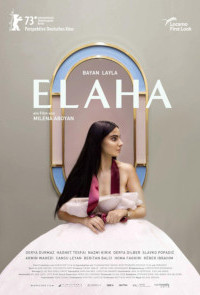| SHADOWS ON THE WALL | REVIEWS | NEWS | FESTIVAL | AWARDS | Q&A | ABOUT | TALKBACK | |||||||||||||||||||||||||||||
 Shadows off the beaten path Shadows off the beaten pathIndies, foreign, docs and shorts...
On this page:
ADIOS BUENOS AIRES |
ELAHA |
KIDNAPPED
| |||||||||||||||||||||||||||||
| See also: SHADOWS FILM FESTIVAL | Last update 30.Apr.24 | |||||||||||||||||||||||||||||
|
Adiós Buenos Aires Review by Rich Cline | 
Is it streaming?
| 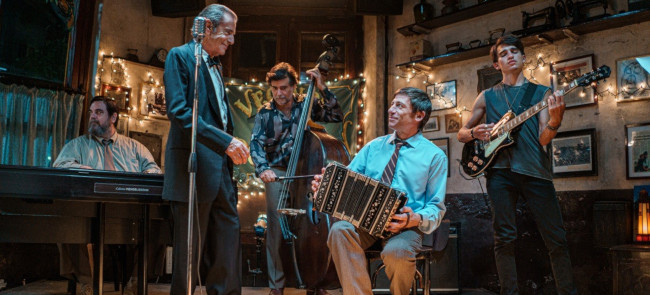 Infused with pulsing tango rhythms, this warm romantic comedy-drama from Argentina is deepened by pointed topical events that feel as resonant today as they were in the film's period more than two decades ago. Strong production values add lovely visual textures that add to the film's engaging style. And the script takes a bittersweet approach to the narrative, exploring conflicting emotions in a wide range of characters. Amid street protests and a collapsing economy in November 2001, Julio (Cremonesi) plays bandoneon with a Buenos Aires tango band while trying to keep his late father's money-losing shoe shop afloat. So he's planning to cash in and get out, moving to Berlin with his reluctant 14-year-old daughter Paula (Narvay). Then fiery taxi driver Mariela (Bellati) smashes his car, which he needs to sell to fund his flights. She's in the same financial mess as a single parent to deaf preteen Pablito (Benante). And everything gets immeasurably worse when the government freezes bank accounts. Julio's bandmates love music so much that they are happy to play for empanadas, even though all of their lives are in crisis. Julio knows he can earn a decent living abroad, but worries about starting over, especially as Paula is determined to stay with her guitar-playing boyfriend (Angeloni). Julio isn't sure he wants to move on his own, and doubts increase as he gets to know Mariela. There's no question where the story will end up, but getting there is charming and gently optimistic. The ensemble cast is wonderfully grounded, creating realistic people who are funny, smart and thoroughly enjoyable to spend 90 minutes with as they travel their own journeys. Cremonesi gives Julio a wry charm as a man who feels trapped, unable to realise his dreams as his country falls apart around him. His decision to make a run for it clearly weighs on his conscience. And his chemistry with the sparky Bellati is enjoyably barbed. Mixing in real documentary footage of street protests, director Kral adds a powerful edge to the film, cleverly finding through-lines across Argentina's history and music. In the end, this is a lovely look at how everyone has to pursue their dreams on their own terms, and in their own way. And if we listen to our heart, we're likely to end up in the right place.
|
| Elaha Review by Rich Cline | 
BERLIN FILM FEST Is it streaming?
| 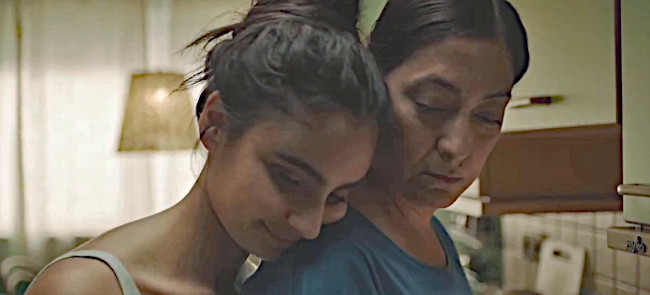 Earthy and honest, this brightly well-made film traces the lives of young people in Germany who are straining against their migrant parents' restrictive culture. As it confronts the collision between sex and tradition, this open-handed film never flinches from difficult ideas. So even if the plot wobbles a bit, writer-director Milena Abovan is deliberately provoking the audience, skilfully depicting how helpless women can feel in a macho society. At 22, Elaha (Layla) is busy with studies while working part-time in a dry-cleaner and helping her Kurdish parents (Durmax and Kirik) care for her disabled little brother (Ibrahim). She's also in the midst of preparations for her marriage to nice guy Nasim (Wahedi). And she has a big secret too: she is looking into hymen restoration to live up to her culture's requirements. But surgery is far too expensive, and other remedies don't work. So she begins to question why she can't have privacy, and why there are different rules for men and women. Stuck in a corner, Elaha's situation is unusually vivid, as she feels pressure from all sides, including her pushy, proud mother, expectant father, bratty teen sister (Dilber) and a fiance who thinks she has to be perfect. There's also her teacher (Tesfai), who tries to help with Western-style advice. So Elaha and her friends (Balci and Faghiri) have become experts at making excuses and covering for each other. She also inexplicably befriends another guy (Popadic) who offers a glimpse of freedom. Performances have low-key authenticity that quickly elicits sympathy. As the strong, smart and independently minded Elaha, Layla sharply captures how it feels to be a young woman who has no space of her own. And since she can't even admit her thoughts to herself, she can't understand what it is that she actually wants. Even as her behaviour becomes increasingly melodramatic, Layla remains engaging. And the supporting cast is complex and authentic as well. It's a bit frustrating that some of the plotting fails to gel with the overall narrative, leading to some heightened situations in the final act. But the central point is strong. In this subculture, women are unable to be honest about almost anything, and it's painful to watch Elaha seek someone she can trust enough to open up to. Finally an anonymous counsellor tells her that she hasn't done anything unnatural or shameful. And in the end, Abovan finds a note of hope.
|
| Kidnapped Rapito Review by Rich Cline | 
| 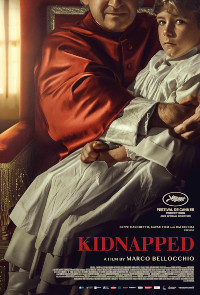 dir Marco Bellocchio scr Marco Bellocchio, Susanna Nicchiarelli prd Beppe Caschetto, Paolo Del Brocco, Simone Gattoni with Enea Sala, Leonardo Maltese, Paolo Pierobon, Barbara Ronchi, Fausto Russo Alesi, Fabrizio Gifuni, Andrea Gherpelli, Samuele Teneggi, Corrado Invernizzi, Filippo Timi, Aurora Camatti, Paolo Calabresi release It 25.May.23, UK 26.Apr.24, US 24.May.24 23/Italy Rai 2h14 CANNES FILM FEST TORONTO FILM FEST   Is it streaming?
| 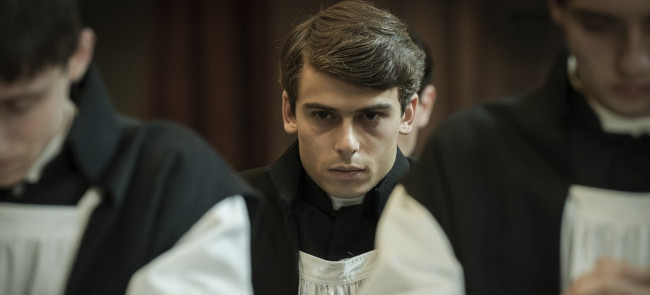 Based on a true story, this epic drama recounts events from 19th century Italy that changed religious and political history. And the implications go beyond the facts themselves, which are genuinely astonishing. Veteran filmmaker Marco Bellocchio tells the story with a sure hand, skilfully recreating the period while tapping into the larger ideas that ripple through the narrative. So the film feels big and very long, but also riveting. In 1858 Bologna, Catholic inquisitor Feletti (Gifuni) removes 6-year-old Edgardo (Sala) from his home claiming that he was secretly baptised as an infant, so can't be raised by Jewish parents (Ronchi and Alesi). Taken to Rome and put under the care of Pope Pius IX (Pierobon) himself, Edgardo adapts to this new life. But in the streets, people are increasingly furious about this kind of papal overreach, and word of the kidnapped Jewish boy spreads throughout Europe and America. Still, the Pope is unbending. Then a decade later, Edgardo (now Maltese) faces his family again. With a steady pace, this film recounts events with clarity and a strong sense of the complexity of the characters' thoughts and feelings. So aside from the way religion has such a grip on society, this barely feels like a period film. Edgardo's parents are strong people who try to rectify this painful situation, including attempts to recapture Edgardo. Once Bologna declares independence from the pope, Feletti is arrested and tried for kidnapping. But of course, he was acting on orders. Each of the central figures emerges as a fascinating character with his or her own intentionality. Much of the story is seen through Edgardo's eyes, and he's beautifully underplayed by both Sala and Maltese, allowing the audience to see into his soul as he is brainwashed by the church. Both performances have power and a strong emotional kick, especially in scenes involving Ronchi and Alesi as his openly terrified parents. Although this story is more than 150 years old, the issues relating to the role of religion in society remain resonant in several intriguing ways. This is an account of the forced indoctrination of a very young boy, leading to his inability to recognise his own heritage. And the Pope's insistence that he was right, regardless of what anyone else said, directly led to his loss of political and military power across Italy and all of Europe. But it's the intensely personal tale at the centre of the film that becomes haunting.
| 
See also: SHADOWS FILM FESTIVAL © 2024 by Rich Cline, Shadows
on the Wall
HOME | REVIEWS | NEWS | FESTIVAL | AWARDS
| Q&A | ABOUT | TALKBACK | | |||||||||||||||||||


